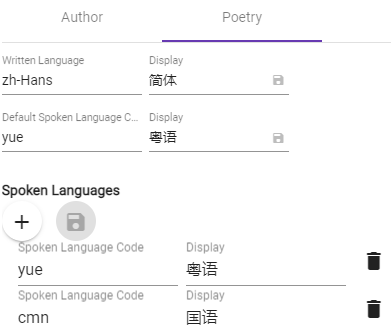Settings for Chinese Poetry: Difference between revisions
Admin>Soulmate mNo edit summary |
Admin>Soulmate mNo edit summary |
||
| Line 1: | Line 1: | ||
In the 20th century, [https://en.wikipedia.org/wiki/Written_Chinese written Chinese] diverged into two canonical forms, simplified Chinese and traditional Chinese. And there exist wide [https://en.wikipedia.org/wiki/Varieties_of_Chinese varieties of spoken Chinese] for the sake of ryhme. [[File:Chinese Poetry Attributes.png|center|Chinese Poetry Attributes]] | In the 20th century, [https://en.wikipedia.org/wiki/Written_Chinese written Chinese] diverged into two canonical forms, simplified Chinese and traditional Chinese. And there exist wide [https://en.wikipedia.org/wiki/Varieties_of_Chinese varieties of spoken Chinese] for the sake of ryhme. | ||
[[File:Chinese Poetry Attributes.png|center|Chinese Poetry Attributes]] | |||
=== Written Language === | === Written Language === | ||
| Line 5: | Line 6: | ||
For example, the language code for Chinese is "zh". If you primary written language is Simplified Chinese and what the app to be able to provide Traditional Chinese representation of your poetry, you should declare the written language as "zh-Hans". Likewise, if you draft in Traditional Chinese, then you should declare the written language as "zh-Hant". | For example, the language code for Chinese is "zh". If you primary written language is Simplified Chinese and what the app to be able to provide Traditional Chinese representation of your poetry, you should declare the written language as "zh-Hans". Likewise, if you draft in Traditional Chinese, then you should declare the written language as "zh-Hant". | ||
==== Applications of Written Language ==== | |||
The written language defined here will be use to render the lang attribute of appropriate HTML element in the GUI for optimal rendering of fronts. That is, the country code plus the written language sub code like "zh-Hans" or "zh-Hant" will be injected to the container element containing the content. | |||
For other languages, you may be interested in checking: | |||
* [https://www.w3.org/International/questions/qa-lang-why Why use the language attribute?] | |||
* [https://www.w3.org/International/questions/qa-choosing-language-tags Choosing a Language Tag] | |||
* [https://www.w3.org/International/articles/language-tags/ Language tags in HTML and XML] | |||
=== Spoken Languages === | === Spoken Languages === | ||
Revision as of 06:19, 9 October 2022
In the 20th century, written Chinese diverged into two canonical forms, simplified Chinese and traditional Chinese. And there exist wide varieties of spoken Chinese for the sake of ryhme.
Written Language
The Written Language code should be from ISO 639-1, and optionally a code of ISO 15924 which is for the representation of names of scripts.
For example, the language code for Chinese is "zh". If you primary written language is Simplified Chinese and what the app to be able to provide Traditional Chinese representation of your poetry, you should declare the written language as "zh-Hans". Likewise, if you draft in Traditional Chinese, then you should declare the written language as "zh-Hant".
Applications of Written Language
The written language defined here will be use to render the lang attribute of appropriate HTML element in the GUI for optimal rendering of fronts. That is, the country code plus the written language sub code like "zh-Hans" or "zh-Hant" will be injected to the container element containing the content.
For other languages, you may be interested in checking:
Spoken Languages
The Spoken Language code should be from ISO-639-3. For example, there are 16 declared spoken languages/dialects for Chinese, and you should pick one like:
- "yue" being displayed as "粤èª"ï¼â广ä¸è¯â or "广å·è¯".
- "cmn" being displayed as "åèª" or "æ®éè¯".
- "nan" being displayed as "é½åè¯" or "å°èª".
